- Home
- David S. Jacobs
24 Declassified: 10 - Head Shot Page 5
24 Declassified: 10 - Head Shot Read online
Page 5
Jack fought down the urge to jerk the trigger, squeezing it instead several times to place a couple of rounds into the rifleman’s middle. The rifleman went over backward like a tin duck in a shooting gallery.
Jack and the rifleman had had fairly clear firing lines on each other. Jack had been fortunate in that Lobo had been unlucky enough to stand up in time to catch that first bullet that had been meant for Jack. No such luck for Frank Neal. The rifleman had tagged him with a head shot. Jack and Lobo had gone crashing down to the planks together, and Lobo had caught the rifleman’s hasty third shot.
The rifleman had done all the damage; his partner must have been more of a spotter and backup. Now he returned fire with the handgun, loosing a fusillade in Jack’s direction. Neither he nor Jack had much in the way of sightlines on each other.
He had a semi-automatic pistol and he must have pumped out a dozen shots. He made a lot of noise, but none of the rounds came close to Jack. He shot out a mess hall window and punched holes in wooden walls, spraying a lot of wood chips, splinters, and sawdust. He was less interested in getting his man than he was in covering his retreat.
He ran north, angling his flight to put the men’s barracks building between him and Jack. Jack raised himself up on his elbows, wiping the back of his free hand across his eyes, trying to clear them of the blood that had sprayed his face when Lobo had been tagged. He got his feet under him and hunkered down beside Lobo, feeling his neck for a tremor of a pulse. He knew it for an exercise in futility but went through the motions anyway, confirming what he’d been certain of, that the man was dead. That first shot had done for him, the one that had been meant for Jack.
Neal lay on his back, face upturned to the night sky. It was like the top of his head had been scooped out with a shovel. The rest of his face below the brow line didn’t look too bad. Jack knew Neal had put the truck keys in his front pants pocket but he couldn’t remember which one so he patted them both down, feeling the keys through his right front pocket. It’s not so easy to pick a dead man’s pocket. Jack knelt beside the corpse, twisting his hand at an odd angle to get it inside Neal’s pocket. Neal’s body was warm with the life that had just been let out of it. Jack’s fingers fastened around the keys and fished them out.
A figure darted out from between the women’s barracks and the blockhouse holding the generator. The rifleman’s partner. He could have done some mischief if he’d thought to disable the Toyota, but the only thing on his mind was escape. He burst out into the open, running east across the oval toward the front gate.
It was a long shot for a pistol, too long, so Jack didn’t even bother trying. He started north, double-timing it. Caution and curiosity compelled him to pause to give the rifleman a quick onceover, drawing him to a halt beside the body.
The shooter was middle-aged with a lanky runner’s physique. He had short wavy hair, bushy eyebrows, and a mean face. His expression was one of intense irritation, as though he was extremely annoyed at having been shot dead. He wore no flak jacket, no bulletproof vest. Jack’s rounds had shattered his chest, one penetrating the heart, negating the need to deliver a coup de grâce to the head.
His weapon was a hunting rifle, a scoped thirty ought-six. A standard telescopic sight, not a night vision rig. Jack snatched up the weapon, shouldering it, but the fleeing gunman was already below the crest of the rise. He put it down and got moving, running to the Toyota.
The triggerman was unknown to Jack, a stranger. No mean feat, since Jack’s access to information as SAC of CTU/L.A. made him cognizant of most of the top pro shooters currently active in the milieu.
He must have been one of Lobo’s devil men, part of the team that’d been searching the hills for him. The other half of the duo was fleeing the compound. That much of Lobo’s story had been true. And the rest?
Jack reached the pickup truck, jumping behind the wheel and starting it up. He made sure to fasten his seat belt harness, he was going to need it. He drove east, fast, toward the front gate.
Neal knew the area and had said there were no roads into or out of the sandstone piles west of the compound. The two killers couldn’t have driven into the compound without having been seen by the CTU agents. Therefore they must have parked their vehicle outside the front gate and entered on foot.
Jack tore across the short axis of the oval, making a beeline for the exit. He paused for an instant at the edge of the top of the slope, scanning the landscape. There weren’t too many places where another vehicle could be. It had to be on the access road or the blacktop road, or parked somewhere just off either road.
A pair of headlights flashed on behind a clump of brush on the shoulder on the east side of the blacktop road, north of where the access road met it. A dark-colored boxy sedan emerged from behind a screen of foliage. Jack thought it might be a Subaru from the quick glimpse he got of it, but that was only a rough guess. The sedan fishtailed along the shoulder and onto the blacktop, flashing north along it in a big, big hurry.
Jack took off after it. He first had to get to the bottom of the hill. He toyed with the idea of saving time by quitting the road and plowing straight down the hillside but discarded it. A big enough rock could bust a tire or an axle and stop the pursuit before it got started.
The pickup’s nose tilted downward as he began descending the dirt switchback road, whipping the steering wheel left and right, standing on the brakes at times, sliding into some of the hairpin turns, whipping through others, laying down fat, feathery plumes of dust as he powered his way down the dirt track.
A couple of heart-stopping instants threatened to see the pickup truck go sailing off the edge, but each time luck or skill or both saw him through, enabling him to thread the twisty course in a speedy blur.
There was a bounce and then a liftoff at the bottom of the slope as all four wheels left the dirt road. Jack felt like a paving stone had been dropped into the bottom of his belly.
A timeless swooping interval came to an abrupt end as all four wheels touched down on the pavement of the two-lane blacktop. The vehicle bottomed out, banging its underside on the roadway with a bone-jarring thud that set Jack’s teeth to rattling, but the shocks absorbed the impact and the tires held up without any of them suffering a blowout.
The wheels bit, gaining purchase, squealing as Jack whipped the steering wheel around to make a hard left, then burning rubber as he stomped the gas pedal and the machine bulleted northward, taking up the chase.
THE FOLLOWING TAKES PLACE BETWEEN THE HOURS OF 5 A.M. AND 6 A.M. MOUNTAIN DAYLIGHT TIME
Nagaii Drive, Colorado
The road ran north-south, hemmed in by a river on the east and mountains on the west. It ran not in a straight line but in broad, sweeping curves molded to the contours of the river valley.
The pickup truck’s engine was well-tuned and possibly customized for speed; there was a lot of power under the hood, as Jack was happy to discover. It handled well on the curves, too.
The sedan ahead knew it was being chased and was doing its best to widen the distance between it and its pursuer. The driver had an advantage over Jack in that he presumably knew the terrain, while to Jack it was all unknown territory.
Jack was a veteran of the Los Angeles Police Department, and while the bulk of his term there had been spent on the SWAT team, he was no stranger to hot pursuit driving. No matter what the locale, a road’s a road, and he was a quick study.
The fugitive had been handicapped by having to flee Red Notch on foot, scrambling down the hillside and across the road to reach the place where he’d hidden the sedan. That had cut down considerably on his lead. He was trying to increase it now, while Jack labored to whittle it down.
The scenery shot by in a blur. The river lay east of the road, to the right of Jack’s northward course. A thin line of trees stretched along the top of the embankment. Gaps in the tree line afforded glimpses of the river and the terrain beyond it, a long, shallow slope slanting upward for several miles to the ridgeline. The
river was about an eighth of a mile wide and flowed southward. It looked fast, frothy and churning with latent power.
The sun was a long way from rising but the sky was lightening in the east, fading from purple- black to royal blue.
This predawn effect was suddenly negated as the pickup truck left Red Notch behind. The notch was just that, a gap between the mountains. The looming bulk of Mount Nagaii appeared to the north of it, a towering rock rampart that rose up and up to dizzying heights. The mountain blocked the low-hanging moon in the west, shutting off the moonlight and throwing the river valley into deep shadow.
A positive result was that the thickened darkness caused the sedan’s taillights to stand out more brightly, a pair of hot red dots gliding above the winding roadway.
Jack switched on his high beams, expanding his view of the road ahead. It was a help at the speed he was traveling. There were no crossroads or intersections as far as he could see, no place where the sedan could turn off in another direction.
Events had happened so quickly that Jack hadn’t dared risk losing a precious second to the distraction of communicating with Central. He could do something about that now that he was settling into the rhythm of the chase.
The mobile comm unit mounted on the dashboard was a variation of the standard model used by CTU/ L.A., so he could work it without too much trouble. He switched it on, its power light brightening to a glowing green bead.
He steered with his left hand, holding the hand mic in his right. He thumbed down the transmit button, said, “Central, this is Unit Three. Over.”
Central acknowledged the transmission. Civilian and military police authorities generally use a numerical code system as a kind of verbal shorthand for their radio communications. A “ten-ten,” say, means that the unit is going temporarily out of service. Other number codes stand for such things as robbery in progress, shots fired, officer down.
CTU wasn’t the police and except for specialized operations, such as those carried out by tactical strike forces, relied on plain speaking and the technological sophistication of their hardware systems to ensure the security and privacy of their communications.
Jack spoke into the hand mic. He had to shout to be heard over the sound of the engine as it ground out the RPMs necessary to keep pace with the sedan. “This is Agent Bauer. This unit was attacked by two shooters at Red Notch. Agent Neal is dead. So is a civilian informant we discovered at the site. One of the shooters is dead, too. His partner is fleeing north in a dark-colored sedan along the road at the foot of Red Notch. I don’t know the name of the road but it runs west of a river.”
The dispatcher started shouting too, out of excitement. He identified the road as Nagaii Drive. Jack said, “I am in pursuit of the vehicle. The driver is armed with a handgun. He may have other weapons. We’re about five miles north of Red Notch and proceeding northward.”
The dispatcher had all kinds of questions about the incident that he wanted answered right away. The road started shifting into a series of tricky S-curves that required Jack’s undivided attention. The sedan had widened its lead while Jack was talking. He signed off, took hold of the wheel with both hands, and concentrated on driving.
The road snaked around outcroppings and concavities of the mountain, an undulating ribbon unwinding at high velocity. Anxiety gripped Jack each time the sedan’s taillights whipped around a curve and out of sight, lessening only when those two red dots came back into view.
Jack drove with one foot on the gas pedal and the other poised above the brake pedal. He put more weight on the accelerator. The engine noise wound up to a higher pitch. He glanced at the temperature gauge on the instrument panel. The needle held steady at the midpoint between the two extremes, right where it was supposed to be. That was good, the engine wasn’t running hot.
The chase had been run on the flat with no real downgrades or slopes to speak of. The road skirted the base of the mountains, avoiding even the foothills. That was okay with Jack, he had his hands full keeping up the pace on this course. The road was bare of all but these two vehicles, the sedan and the pickup truck.
Jack sat hunched forward over the steering wheel like a jockey leaning into the saddle. His skull pounded with a splitting headache, the king-sized killer headache of all time.
No mystery about that. It was the altitude. Jack came from Los Angeles, he was a flatlander. But Denver was a mile above sea level and the Red Notch area was higher than that. He wasn’t acclimated to the elevation. The experts said that flatlanders should take it easy for their first day or two in the heights to avoid altitude sickness. It wasn’t a matter of conditioning, a trained athlete from the lowlands was as likely as an overweight, lazy layabout to suffer ill effects from initial exposure to the rarefied air of the mountains.
Jack’s head felt like a railroad spike was being hammered into the center of his skull between the twin cerebral hemispheres. Then he remembered Neal with the top of his head shot off. Jack decided he was damned lucky to have a head to suffer headaches with. He’d tough it out, let the adrenaline rush of the hunt help power him through it.
The curves started to smooth out, flattening into a long straightaway. Jack floored the gas pedal. The pickup shook from the engine vibration, but it was manageable. The engine roar almost but not quite drowned out the transmissions of the frantic dispatcher at Central as he kept firing off demands for an update on the situation.
The situation was that Jack was closing in on the sedan. It was only a couple of hundred yards or so ahead, and the gap was steadily decreasing. Whatever the sedan had under the hood, it lacked the muscle of the pickup truck, and that lack was inexorably telling.
The sky was lightening. A trestle bridge spanning the river came into view on the right. A gap opened opposite it on the left, where Mount Nagaii ended. It was a crossroad that cut Nagaii Drive at right angles. A handful of buildings stood at the junction.
The bridge was a railroad bridge, inaccessible to vehicular traffic. Railroad tracks stretched from the west end of the bridge, crossing Nagaii Drive and continuing into the gap between Mount Nagaii and a mountain to the north of it.
The tracks that crossed the road at right angles were sunken, the twin rails inset in slotted grooves in the asphalt. There were no cross ties. A black-and white-striped bar and a set of signal lights marked the crossing. No train was using the line so the signal lights were dark and the barrier gate was raised to permit free passage.
A small town was clustered around the crossing. Town? It wasn’t even a village. A hamlet, maybe. There were a gas station, a diner, a strip lined with a couple of convenience stores, a post office, and a handful of houses.
The sedan blew through the crossing with no slackening of speed. The pickup truck did the same, flashing over the sunken railroad tracks with nothing but a slight change in pitch in the whirring drone of the racing wheels on the roadway to mark their presence.
Jack glimpsed in the corner of his eye a tiny café fronting the east side of the road. A police car stood parked beside its north wall, facing the road at right angles. Its lights were dark, but he could make out what looked like two figures in the front seat.
He passed them doing about eighty, eighty-five miles per hour. He’d been going faster but had slowed down a hair just to be on the safe side when crossing the railroad tracks. They proved to be no obstacle, so once he’d cleared them he pushed the pickup back up to ninety.
There was a pause while the occupants of the police car woke up or got over their stupefaction at seeing a high-speed chase zip right by them. Then the police car swung out of the lot into the northbound lane, turned on its headlights, switched on the emergency flashers of its rooftop light rack, and took off after the sedan and the pickup truck.
Jack glanced in his rear-view mirror, seeing the police car’s light rack flickering bright blue and white. They looked bright and happy, like party lights. They were a long way off. The sedan was much closer, the gap between it and the pickup t
ruck closing up.
Telephone poles lining the roadside went by in a blur. Road signs whipped by so fast there was no time to read them.
The road started to slope upward, beginning a long gentle incline that curved slightly to the west, rounding the southernmost limb of Mount Zebulon, the next peak north of the gap beyond Mount Nagaii.
Jack was so close to the sedan that he could make out the outline of the driver’s head and shoulders. How to take him? He’d like to take him alive if he could, but at these speeds that would be a tall order. He didn’t intend on getting killed himself trying it. The pickup was bigger than the sedan, had more muscle. He could run him off the road, if it came to that. If he came alongside the sedan, he could shoot him. The fugitive had a gun, too, though, and Jack didn’t fancy the idea of trading shots with him at ninety miles an hour. No, best to bull him off the road. If the other should survive the crash, so much the better.
The sedan was nearly at the crest of the long incline. A peek in the rear-view mirror told Jack that the police car was still a long way behind.
The sedan topped the summit, disappearing down the other side. The hilltop zoomed ahead, and for a split second Jack was looking down at the far side of the slope.
There was a village at the bottom of the hill. There wasn’t much to it but it was a metropolis in comparison to the whistle-stop at the railroad crossing. A bridge spanned the river here, too, but this one was for cars and trucks.
A strip of stores lined both sides of Nagaii Drive at the village’s center. Jack guessed that was what passed for Main Street, the business district. A dozen or so two- and three-story brick buildings were grouped around both sides of the main drag. A couple of blocks of one-family houses stood on the west side of town.

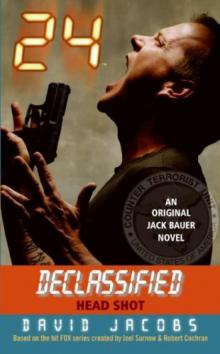 24 Declassified: Head Shot 2d-10
24 Declassified: Head Shot 2d-10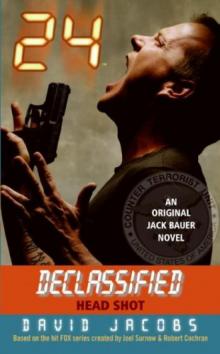 24 Declassified: 10 - Head Shot
24 Declassified: 10 - Head Shot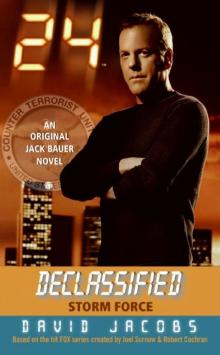 24 Declassified: 07 - Storm Force
24 Declassified: 07 - Storm Force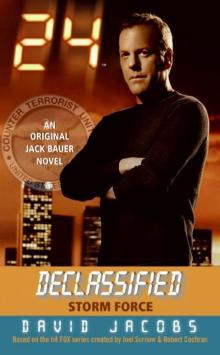 24 Declassified: Storm Force 2d-7
24 Declassified: Storm Force 2d-7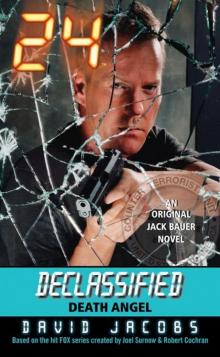 24 Declassified: Death Angel 2d-11
24 Declassified: Death Angel 2d-11